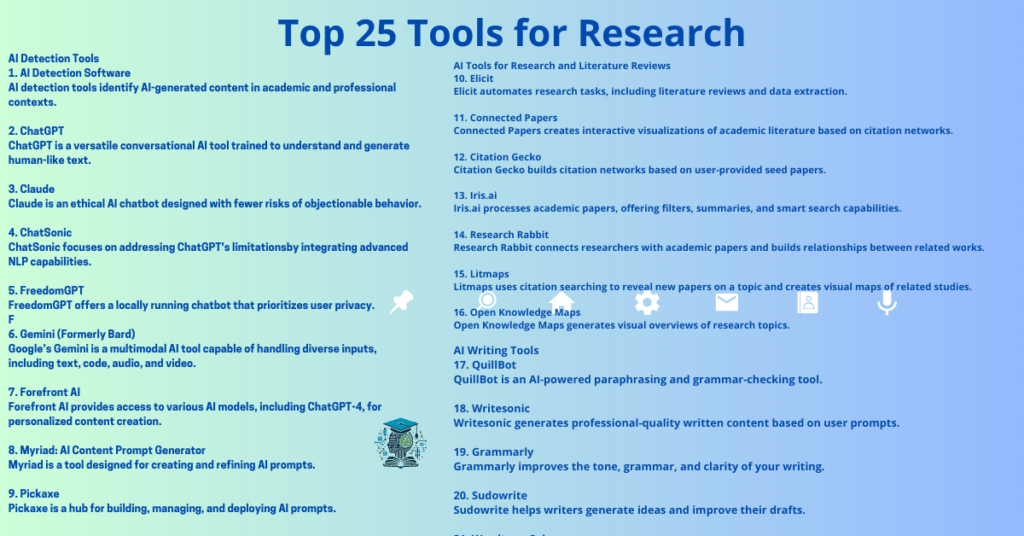
Artificial Intelligence (AI) tools are transforming workflows across academia, business, and creative industries. From detecting AI-generated content to conducting advanced research and crafting polished writing, AI offers endless possibilities for improving productivity and innovation. This guide explores the best AI tools for detection, research, and writing, with detailed descriptions of their features, use cases, and benefits.
AI tools bring efficiency and accuracy to repetitive tasks, enabling users to focus on creativity and decision-making. They are pivotal for:
Whether you’re a researcher, student, or professional, these tools can revolutionize how you work.
1. AI Detection Software
AI detection tools identify AI-generated content in academic and professional contexts.
Features:
2. ChatGPT
ChatGPT is a versatile conversational AI tool trained to understand and generate human-like text.
Features:
3. Claude
Claude is an ethical AI chatbot designed with fewer risks of objectionable behavior.
Features:
4. ChatSonic
ChatSonic focuses on addressing ChatGPT’s limitations by integrating advanced NLP capabilities.
Features:
5. FreedomGPT
FreedomGPT offers a locally running chatbot that prioritizes user privacy.
Features:
6. Gemini (Formerly Bard)
Google’s Gemini is a multimodal AI tool capable of handling diverse inputs, including text, code, audio, and video.
Features:
7. Forefront AI
Forefront AI provides access to various AI models, including ChatGPT-4, for personalized content creation.
Features:
8. Myriad: AI Content Prompt Generator
Myriad is a tool designed for creating and refining AI prompts.
Features:
9. Pickaxe
Pickaxe is a hub for building, managing, and deploying AI prompts.
Features:
10. Elicit
Elicit automates research tasks, including literature reviews and data extraction.
Features:
Best For: Systematic reviews and data analysis.
11. Connected Papers
Connected Papers creates interactive visualizations of academic literature based on citation networks.
Features:
Best For: Exploring citation networks.
12. Citation Gecko
Citation Gecko builds citation networks based on user-provided seed papers.
Features:
Best For: Identifying foundational and cutting-edge studies.
13. Iris.ai
Iris.ai processes academic papers, offering filters, summaries, and smart search capabilities.
Features:
14. Research Rabbit
Research Rabbit connects researchers with academic papers and builds relationships between related works.
Features:
15. Litmaps
Litmaps uses citation searching to reveal new papers on a topic and creates visual maps of related studies.
Features:
16. Open Knowledge Maps
Open Knowledge Maps generates visual overviews of research topics.
Features:
17. QuillBot
QuillBot is an AI-powered paraphrasing and grammar-checking tool.
Features:
18. Writesonic
Writesonic generates professional-quality written content based on user prompts.
Features:
19. Grammarly
Grammarly improves the tone, grammar, and clarity of your writing.
Features:
20. Sudowrite
Sudowrite helps writers generate ideas and improve their drafts.
Features:
21. Wordtune Spices
Wordtune Spices enhances writing with citations and real-time data from the internet.
Features:
22. Grantable
Grantable leverages AI to draft responses to funding prompts.
Features:
23. Granted.ai
Granted.ai uses successful proposals as templates to create effective grant submissions.
24. Fireflies.ai
Fireflies.ai records and transcribes meetings with keyword highlights.
Features:
25. Synthesia
Synthesia converts text into professional videos with customizable avatars.
Features:
26. VOSviewer
VOSviewer visualizes bibliometric networks based on citation, co-authorship, and text mining.
Features:
27. Scispace
Scispace decodes academic papers for faster comprehension.
Features:
28. Scholarcy
Scholarcy summarizes research papers into concise takeaways.
Features:
When selecting an AI tool, consider:
AI tools for detection, research, and writing are transforming how we approach academic and professional tasks. Whether it’s uncovering hidden patterns in research, simplifying the writing process, or ensuring ethical standards, these tools offer unparalleled opportunities to innovate and excel.
By leveraging these resources, you can save time, enhance creativity, and achieve groundbreaking results in your field.
1. What is the best AI tool for literature reviews?
Elicit and Connected Papers are excellent for automating literature reviews.
2. Which AI tool is best for writing grants?
Grantable and Granted.ai simplify the grant-writing process with AI-powered templates.
3. Can AI tools improve academic writing?
Yes, tools like QuillBot and Grammarly enhance clarity and correctness.
4. How do AI tools help with citation management?
Tools like Citation Gecko and Iris.ai organize and visualize citation networks effectively.
5. Are these AI tools free to use?
Many tools, like Google Scholar and Research Rabbit, offer free access, while others provide premium options.
Let me know if you’d like visuals added or any specific details elaborated!

Dr. Chopra is the founder and editor of thephdcoaches.blogs and Thephdcoaches Learn more about her here and connect with her on Instagram, Facebook and LinkedIn.
Dr. Tripti Chopra, founder of The PhD Coach, is an award-winning mentor and leader in integrating AI into academic research, with over a decade of experience guiding PhD students and researchers. Her work revolutionizes research processes, promotes sustainable writing practices, and inspires scholars to embrace technological advancements.
Copyright© 2023 Thephdcoach All rights reserved.
Leave a Comment